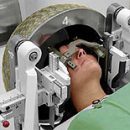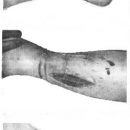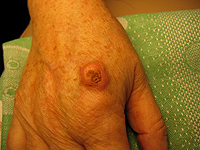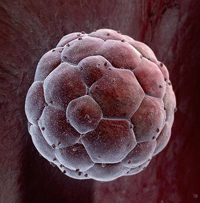Clinical picture of kidney cancer changeable and multi-family. It should be noted that there is quite often no dependence between the magnitude of the tumor, the degree of its propagation and the clinical course of the disease.
Content
When the first complaints are palpable, the tumor is possible in 50-60%
Patients. Palpation capabilities depend on the magnitude of the tumor,
its localization and state of the front abdominal wall. Pain in hypochondrier
On the side of the defeat, it is more common for large tumors that
As it grows, the renal capsule is stretched or squeezed nervous
trunks. The combination of all listed symptoms that detect
10-20% of patients, as a rule, testifies to the far
process. Frequency is more often found from non-performing symptoms,
Arterial hypertension, polycythemia, anemia, hypercalcemia,
Hepatic dysfunction.
Diagnostics of kidney cancer
Diagnosis of kidney tumors, if
modern research methods, no particular difficulties.
Laboratory methods have auxiliary value. Diagnosis
Based mainly on the results of ultrasound,
X-ray, computer and magnetic resonance tomography. How
Rule Study begins with an excretory (intravenous) urography,
which allows you to get an idea of the kidney function and in separate
Cases establish the presence of a surround process. On tomograms detect
The volume and contours of the kidney, the relationship of it with the surrounding authorities
and tissues. At the same time, you can establish the degree of distribution
tumor process, t.E. reveal the spread of the tumor to the area
kidney gates, the presence of affected lymph nodes and thrombus in the lower
hollow vein, metastases in the liver. Angiography (Radiographic examination of vessels with the introduction of a contrasting thing) It is advisable to produce
only if there are doubts about the diagnosis or surgeon
Interested in the blood supply of the tumor. Kavagraphia (the introduction of contrast to the lower hollow vein through the thigh veins) is used for
establishing the degree of propagation of the tumor process, while
Reveal the thrombus in the lower hollow vein, its compression and displacement of the tumor.
Surgery
Cancer kidney
Basic
and the only radical treatment method is surgical
intervention. Radiation and chemotherapy have auxiliary value.
With regard to the testimony to nephrectomy patients with cancer I, II and III stages
There is a single opinion: if there are no generally accepted contraindications
To surgical treatment, it is necessary to remove the kidney with fatty tissue
and lymph nodes with metastases. As for patients with cancer
IV stages, in each case an individual approach is necessary.
So,
patients with kidney cancer IV stage whose state remains
satisfactory, should be operated if they have singles
Metastasis.
It is argued by the feasibility of performing nephrectomy in patients with metastases with the following considerations:
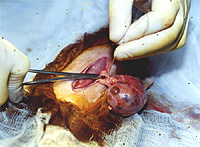 Nephrectomy (removal of affected kidney) Allows liquidate disease symptoms —
Nephrectomy (removal of affected kidney) Allows liquidate disease symptoms —
Pains, exhausting octants cease, appetite and many
patients condition improving so much that they can proceed
to work. Remission can last from 3-4 months to a year or more;
- The operation eliminates complications associated with the collapse of the tumor, in T.C. massive bleeding and intoxication;
- Removing the main massif of the tumor and reducing the volume of tumor masses, we
The most increase the possibilities of the following chemotherapy
and radiation treatment.
Contraindications
Operational intervention serve as an extreme degree of exhaustion of the body, edema, massive
multiple metastases, violation of the function of the remaining kidney, heavy
associated diseases in which anyone is contraindicated
surgical intervention. The risk of operation should not be higher
ordinary. It should be emphasized that when testing
to operations in patients with metastases, it is necessary to take into account limited
Opportunities for subsequent medicinal and radiation therapy.
In recent years, thanks to improving
diagnostic technology, in patients with small tumors steel
Apply kidney resection (partial excision of the affected organ). Direct indication for this
Operations are the functional failure of the remaining kidney or
Tumor in the only functioning kidney. Performance
Kidney resection with good functions of both kidneys, if a tumor is less than 3
cm. However, it should be remembered that the probability of recurrence (repetition, renewal) remains
Diseases.
Drug treatment of kidney cancer
Efficiency
medicinal methods for the treatment of kidney cancer and its metastases to this
Time remains low. Most effective should be recognized
Immunotherapy. Using A-interferon preparations (Nitron-A,
Reaffeferon, Rooferon, Wellferon allows you to get up to 30-35% full
and partial tumor regression. Regressions are usually,
Single, small metatase sizes in lungs. Effect of application
A-interferon preparations can sometimes manifest themselves after several
months after the start of therapy.
Treatment must be carried out constantly,
without interrupting and after reaching regression. Interferon preparations
There are such side effects as hyperthermia, muscle pain,
sometimes — Reducing body weight. In efficiency with interferon when
kidney cancer metastases can compete only interleukin-2, however
The preparation has pronounced side effects and high cost.
From cytostatics when kidney cancer are effective
Preparations like Vinblastine, Wincristian, CCNU (Lomoustine), Bleomycin,
Cisplatin, etoposide, adriamycin, cyclophosphane, hydroxymeur.
The effectiveness of combination therapy — 15-20%.

